| 2004 |

|
YEAR BOOK |
Fond�ireacht Eola�ochta �ireann
|
Science Foundation Ireland
|
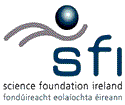
|

|
The year 2004 has been another period of substantial progress for Science Foundation Ireland (SFI) as it has continued to establish new programmes and further increase the level of funding for research in the fields underpinning information and communications technology (ICT) and biotechnology (BioT).
This year SFI also made its first awards to a broader range of research disciplines under the Basic Research Grants Programme.
Achievements in 2004
-
Funding more than 180 research programmes based in Ireland.
-
Facilitating Irish research institutions to recruit and retain research leaders from around the world to Ireland.
-
Supporting a wide range of research fields - embracing the Earth Sciences, Engineering, Mathematics, Physical Sciences, Biosciences and Computer Science under the Basic Research Grants Programme (BRGP).
-
Supporting government agencies and departments with scientific advice and consultations.
-
Raising both the amount and the quality of the scientific research being undertaken by all members of the Irish research community.
-
Establishing connections between SFI Funded researchers, secondary science teachers and industry researchers.
-
Funding collaborative projects with China under the Ireland-China Research Collaboration Fund Agreement.
-
Proactively encouraging industry to locate their research laboratories in Ireland in partnership with the IDA.
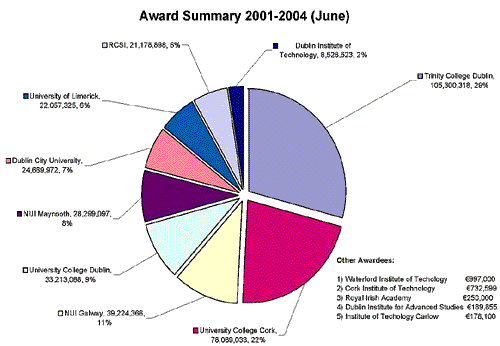
SFI funding programmes
SFI now has a flexible grants and awards portfolio. For more details, see www.sfi.ie
In addition to our existing programmes, SFI has also introduced a number of new funding programmes including:
-
President of Ireland Young Research Awards to attract researchers to Ireland and support Irish-based researchers within five years of completing their PhD.
-
The Science Teacher Assistant Researchers (STAR) supplements, to support second-level teachers in conducting research in Irish laboratories during summers.
-
Industry Supplements Programme to fund collaborative projects with industry that are directly related to and enhance existing SFI peer-reviewed programmes.
-
The SFI Undergraduate Research Experience & Knowledge Award (UREKA) programme, to support active research participation by undergraduate students in any of the areas of research funded by Science Foundation Ireland.
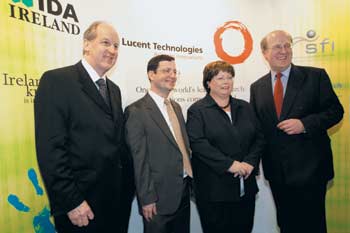
Bell Labs Ireland and the Centre for Telecommunications Value-Chain-Driven Research (CTVR)
Ireland is set to become a world-leading location for research into engineering, manufacturing and value-chain technologies in the telecommunications sector as a result of an investment programme agreed between Lucent Technologies' Bell Labs, IDA Ireland and SFI. Along with the CTVR to be headquartered at Trinity College Dublin (TCD), the project will also feature the establishment of a Bell Labs centre in Ireland.
The centre will be a global headquarters for research into telecommunications and supply chain technologies and will be located at Lucent's facility in Blanchardstown, Dublin.
The research to be undertaken in CTVR will focus on advancements in product engineering, manufacturing and value/supply chain techniques, tools and technologies. The expertise and know-how developed in the centre will facilitate, stimulate and encourage design and innovation and allow for new products to be brought to the market more quickly and more efficiently. That expertise and know-how will be directly applicable to both multinational and indigenous companies engaged in the design, manufacture and operation of highly refined electronics products, including the next generation of fixed and wireless communications networks.
The CTVR will involve eight other leading Irish Universities and Institutes of Technology, including the University of Limerick; National University of Ireland Maynooth; Dublin Institute of Technology; Institute of Technology, Sligo; University College Dublin (UCD); Dublin City University; and University College Cork (UCC) and NMRC.
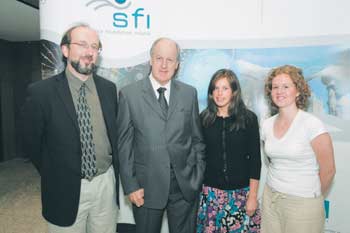
Two new CSETs funded by SFI
SFI designed the Centres for Science, Engineering and Technology (CSET) programme to build a critical mass of excellence for Ireland in areas of BioT and ICT that could well shape the future of science and engineering.
The first recipients of CSET grants were Prof. Dieter Fensel, of the Digital Enterprise Research Institute at National University of Ireland Galway (NUI Galway); Prof. Dolores Cahill, of the Centre for Human Proteomics, at the Royal College of Surgeons in Ireland and Prof. Fergus Shanahan, of the Alimentary Pharmabiotic Centre at UCC.
In 2004, SFI funded two additional CSETs:
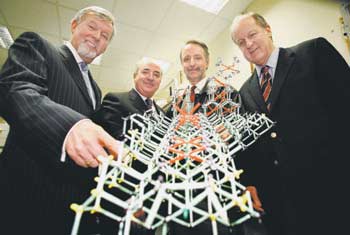
CSET: Regenerative Medicine Institute
How do cells form organs? How do they organise themselves in three dimensions and maintain � and regenerate � different tissues? These are the sorts of questions that will be asked by researchers at the Regenerative Medicine Institute (REMEDI), based at NUI Galway. Regenerative Medicine is an exciting, emerging discipline that promises to partially replace current conventional medicine with its reliance on invasive techniques. REMEDI is headed by Prof. Tim O'Brien. The Centre's main areas of focus are: gene therapy and adult stem cell research.
Initially, REMEDI will concentrate on the regeneration of heart muscle damaged as the result of heart attacks, and on the regeneration of cartilage in joints affected by osteoarthritis.
Industry partners, such as Medtronic Vascular (Galway), will ensure that the REMEDI CSET will play a vital role in embedding high value R&D in Ireland. In common with the other SFI CSET investments, the industrial partnerships created and sustained at REMEDI will help underpin the growth of future biotechnology firms in Ireland.
CSET: Centre for Research on Adaptive Nanostructures and Nanodevices
Nanotechnology has impacts on research in fields underpinning both ICT or BioT.
The ability to build new structures and devices atom by atom has endless possibilities. For example, advances in nanotechnology will give us the next generation of micro � nano � electronics technologies and new drug delivery systems. The field is strongly multidisciplinary and involves researchers from diverse backgrounds and a wide array of skills.
Recognising this, SFI announced funding for the Centre for Research on Adaptive Nanostructures and Nanodevices (CRANN). The funding includes a contribution to a new state-of-the-art specialised nanoscience research facility based at Trinity College, and funding will be shared by TCD, UCC and UCD. CRANN's principal industry partner is Intel Ireland Ltd, and it will be headed by Prof. John Pethica, FRS.
CRANN will also feature strong collaborations with Irish small and medium enterprises, including Allegro Technologies Ltd, Commergy Ltd, Magnetic Solutions Ltd and Eblana Technologies Ltd.
Find out more, or apply for a grant at www.sfi.ie